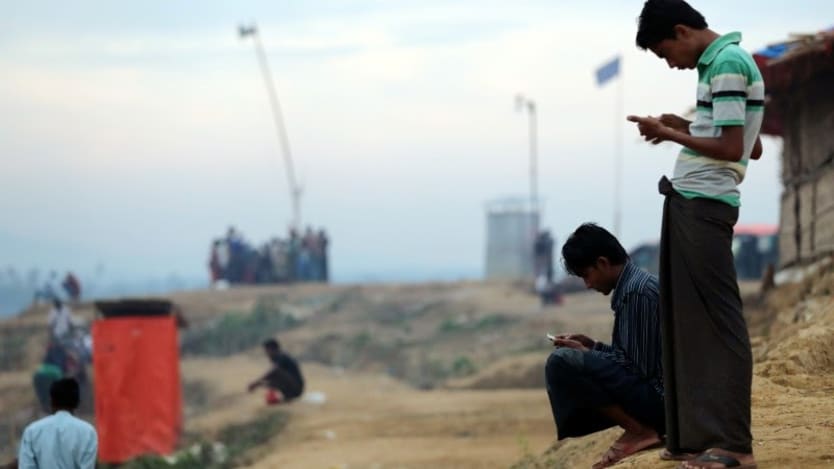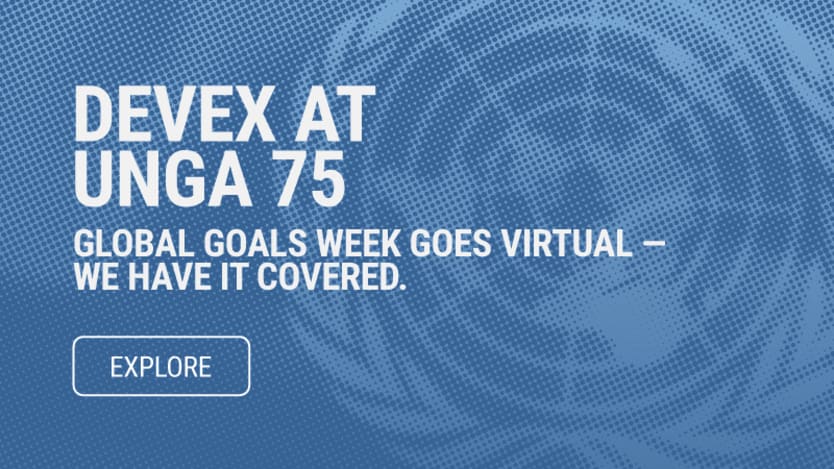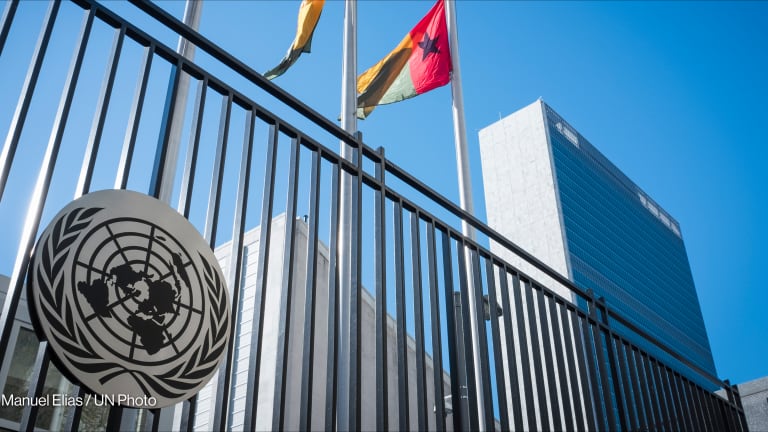
SAN FRANCISCO — As the COVID-19 pandemic pushed essential services ranging from schooling to health care online this year, it has laid bare the implications of the global digital divide.
Those who lack access to internet connectivity, digital skills, or affordable devices are being left behind by an increasingly digital society.
One major topic of conversation at this week’s virtual United Nations General Assembly was digital inclusion as a key pillar of COVID-19 recovery and achievement of the Sustainable Development Goals.
Digitalization "is the quickest and most democratic route to reaching everybody ... and reconfiguring our citizenry for the new world post-COVID," said Mokgweetsi Masisi, president of Botswana, during a World Economic Forum session titled “Harnessing Technology To Meet the Global Goals.” He called digital access essential for both responding to the pandemic and achieving the SDGs and urged his fellow leaders to fast-track their plans for digitalization.
How is COVID-19 affecting progress on the SDGs? Will online meetings mean greater international representation? Our reporters are covering the all-virtual 75th United Nations General Assembly to find out.
Sessions covered how the public health crisis is driving rapid digitalization across sectors, while also highlighting the urgency of bridging the digital divide. Despite the constraints of a virtual meeting, leaders from across sectors identified opportunities for partnerships to advance the digital inclusion agenda.
Before COVID-19, the Bangladesh-based company Praava Health had a “brick-and-click” model, whereby in-person family health facilities were supported by apps.
When the pandemic hit, the company pivoted to remote health services, Sylvana Sinha, founder and CEO of Praava, told Devex.
Praava offered free COVID-19 screening calls on a dedicated hotline, converted in-clinic appointments to video consultations, and developed a product to help people with cases that did not require in-person consultations to manage their illness from home — all enabled by the government’s investments in digital inclusion.
An important question for telehealth, as well as other digitally enabled essential services that have seen a surge in usage over the past six months, is how to build on the momentum of COVID-19 in a way that includes the hardest to reach.
“COVID-19 has brought into stark relief the need to accelerate digitization of economies in ways that are inclusive of all people, everywhere.”
— Parag Mehta, executive director and senior vice president, Mastercard Center for Inclusive Growth“Internet connectivity is much more than access to the World Wide Web, to Facebook, or to digital services,” said Sigve Brekke, president and CEO of the international telecommunications company Telenor Group. “It is a platform you can use to move services out in the villages of Bangladesh.”
In a session titled “Accelerating Digital Inclusion During COVID-19” at the World Economic Forum’s Sustainable Development Impact Summit, he mentioned villages in Bangladesh — one of the countries where Telenor operates — that may not have banks, hospitals, or schools but where the use of mobile phones is widespread.
“Easen up financial, health, education regulations so you can go from the traditional way into more digital ways of solving the problem,” he said.
Panelists discussed what lessons have been learned from the COVID-19 crisis and how to ensure those services reach people who might otherwise be left behind, mentioning WEF’s Essential Digital Infrastructure & Services Network, or EDISON Initiative, as one forum for the conversation to continue.
“COVID-19 has brought into stark relief the need to accelerate digitization of economies in ways that are inclusive of all people, everywhere,” Parag Mehta, executive director and senior vice president of the Center for Inclusive Growth, the philanthropic hub of Mastercard, told Devex via email.
“Financial inclusion is and has been a critical starting point. But the end goal is not only banking the unbanked and unlocking access to credit,” he wrote. “If we are to come out of this stronger than before, we need to use technology and data science to meaningfully advance financial security and economic mobility. That’s important in the journey to an inclusive recovery.”
One opportunity presented by the virtual Sustainable Development Impact Summit was the chance to hear from people around the world who could not have traveled to New York City this week.
For example, Luvuyo Rani, CEO of Silulo Ulutho Technologies, which provides information communication technologies to townships and rural areas in South Africa, joined the WEF session on digital inclusion to discuss what factors, in addition to reliable connectivity, are essential for remote learners.
Hand-holding is key in the beginning of online training, learners need a place to go when they face technical difficulties, and blended learning, which combines online materials with classroom methods, has an essential role to play, he said.
UN outlines plan to unite isolated digitalization efforts
There is a need for more awareness, funding, and collaboration for the global community to act on a new United Nations road map, says Undersecretary-General Fabrizio Hochschild, special adviser for digital cooperation.
Rani discussed how the COVID-19 pandemic has led Silulo Ulutho Technologies to introduce new courses to help students build the skills they need to succeed in an increasingly digital economy, including coding for kids, entrepreneurship, computer literacy, and more.
A key question at this week’s virtual UNGA was how countries can incorporate digital inclusion policies into their national priorities.
“Now more than ever, digital economy means a lot for countries,” said Didier Nkurikiyimfura of Smart Africa, which is focused on expanding access to broadband and the use of information and communications technologies on the African continent, in a session at Concordia. “Without digital transformation, countries are missing out.”
Digital platforms offer the potential for job creation on an individual level, and on a national level, they can increase public service delivery, efficiency, and effectiveness, he said.
As unequal access to digital services threatens to make the multiple impacts of the COVID-19 pandemic worse for communities that remain offline, Nkurikiyimfura and his fellow panelists at Concordia, WEF, and other UNGA-week events seemed to speak with a new sense of urgency to connect the unconnected.

Search for articles
Most Read
- 1
- 2
- 3
- 4
- 5








